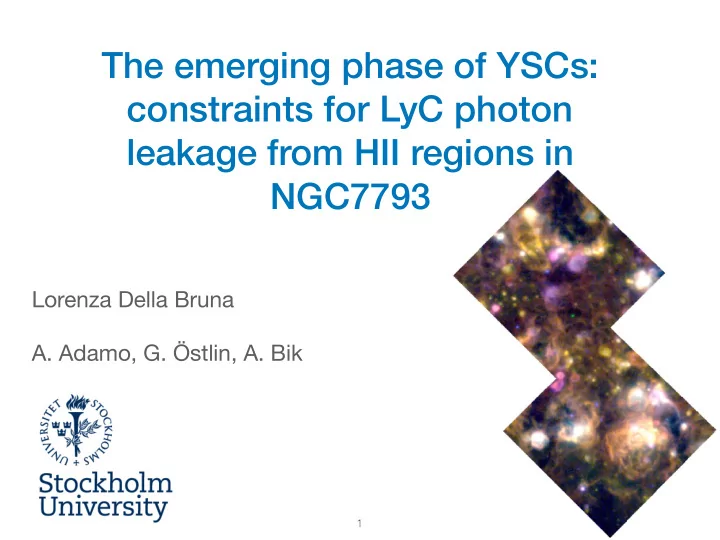

The emerging phase of YSCs: constraints for LyC photon leakage from HII regions in NGC7793 Lorenza Della Bruna A. Adamo, G. Östlin, A. Bik � 1
Stellar feedback 30 Dor Chandra HST Spitzer 180 pc ! 2 http://chandra.harvard.edu
Stellar feedback M 82 Chandra HST Spitzer 8 kpc ! 3 http://chandra.harvard.edu
NGC 7793 • NGC 7793: • MUSE observation: • d = 3.4 Mpc • λ = 4600 - 9350 Å • SFR(UV) = 0.52 M sun /yr • AO, seeing ~ 0.7’’ (10 pc) • Z = 0.8 Z sun HST ALMA MUSE AO science verification (PI A. Adamo) ! 4
Blue: 4875-4950 Å Green: 6520-6528 Å Red: 6750-6810 Å
Blue: [ ΟΙΙΙ ] Green: [SII] Red: H α
Halpha line- and velocity map ! 8
HII regions selection • ASTRODENDRO —> tree representing the hierarchy of structures in the data leaves branch http:// dendrograms.org 9
HII regions sample 96 regions ! 10
HII regions sample Median mass ~ (1000 +/- 500) M sun ! 11
Ionised gas properties • Levesque et al. 2010: b • Z = 0.004 - 0.02, q = (1 x 10 7 - 4 x 10 8 ) cm/s • n e = 100 cm -3 (~HII regions), instantaneous v shock burst of 0 Myr • Kewley+Dopita 2001: upper limit for SF galaxies q • Allen et al. 2008: Z • b = (0.001 - 100) μ G, v shock = 100 - 1000 km/s • n e = 10 cm -3 (~ DIG), solar metallicity ! 12
Ionised gas properties ! 13
Ionised gas properties ! 14
Ionised gas properties ! 15
Ionised gas properties ! 16
Ionised gas properties ! 17
Ionised gas properties ! 18
Leaking HII regions • f DIG = F(H α ) DIG / F(H α ) HII = 0.23 • Is the leaking from HII region su ffi cient to explain the DIG fraction observed? • Model expected ionising flux Q(H0) expected • stars: spectral type of stars inside HII regions • YSC: stellar population synthesis code Kennicutt 1998 Q(H 0 ) expected Q(H 0 ) observed L(H α ) ∝ —> f esc for each HII region. ! 19
Summary • We observe di ff use ionised gas permeating the entire FOV, f DIG ~ 0.23 • YSC in HII regions are observed to be on average younger than field clusters (3 vs 6 Myr) —> HII regions too faint or already dissolved? • Ionised gas properties: little overlap of DIG with shock models in BPT diagram • Photons streaming out of HII regions? ! 20
• Future science with ELT/MOSAIC • • • Low-resolution mode (HMM) will allow us to image typical HII region sizes at d ~ 50 - 80 Mpc —> K. Hollyhead’s poster • NGC 34 (d = 84 Mpc) usters in M the • • tigate • • • α • the α • • α luminosity selected to compare ‘inner’ • • and ‘outer’ regions tribution of • a α ! 21 Σ – α • • • α • α • • α luminosity selected to compare ‘inner’ • and ‘outer’ regions • – α – Ӧ – – Σ – α – – Ӧ – –
Future science with ELT/MOSAIC • What’s new/interesting? • at ~ 80 Mpc we sample the full spectrum of galaxy types (morphology, SF intensity) Antenna galaxy (20 Mpc) • also NIR information: shock tracers: e.g [Fe II] SF tracers: e.g Pa- β , Br series ! 22
Future science with ELT/MOSAIC • High resolution mode (HDM) will allow for similar spatial resolution to MUSE in local galaxies but at much higher distance ( ~ 20 - 50 Mpc) • What’s new/interesting? Higher depth + NIR allows e.g to study extreme SF regimes like UV bright extended disks M 83 Hernandez+ 19 (5 Mpc) Bresolin+ 09 ! 23
Ti ank you! � 24
Recommend
More recommend